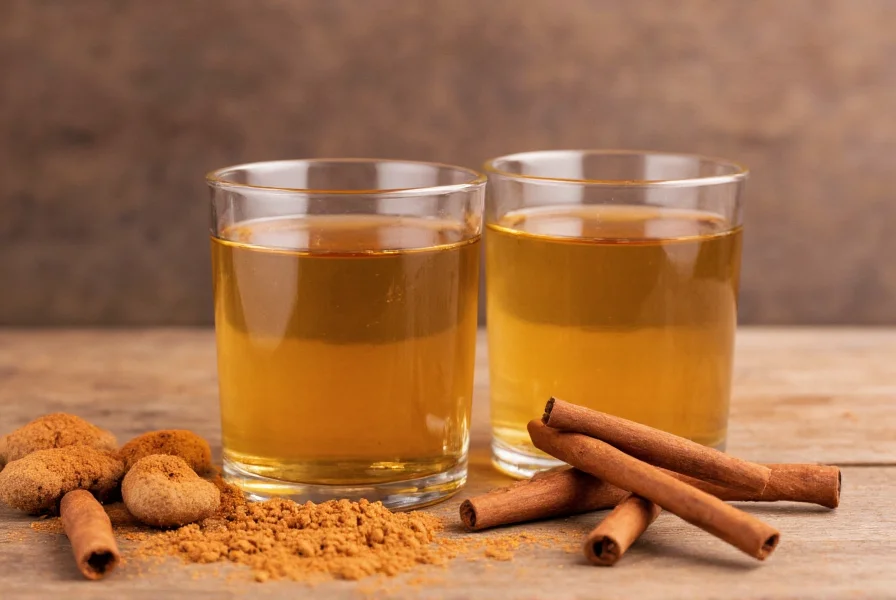Many wellness enthusiasts praise cinnamon water as a simple morning ritual with remarkable health benefits. This article examines what science actually says about drinking water infused with cinnamon, separating evidence-based findings from popular myths. While cinnamon contains beneficial compounds, understanding the realistic scope of its effects is crucial for making informed health decisions.
Understanding Cinnamon Water and Its Popularity
Cinnamon water typically involves steeping cinnamon sticks or powder in hot or room-temperature water. This practice has gained traction through social media and wellness communities as an accessible way to potentially harness cinnamon's bioactive compounds. The appeal lies in its simplicity—requiring minimal preparation compared to other health trends—while offering a flavorful alternative to plain water.
When exploring health benefits of drinking cinnamon water, it's essential to distinguish between traditional uses, preliminary research findings, and unsubstantiated claims. Cinnamon has been used medicinally for centuries in various cultures, but modern science provides a more nuanced understanding of its actual effects when consumed in water form.

Scientifically Supported Benefits of Cinnamon Water
Research suggests several potential benefits associated with cinnamon consumption, though most studies examine cinnamon itself rather than specifically cinnamon water:
| Benefit | Scientific Support Level | Key Research Findings |
|---|---|---|
| Blood Sugar Regulation | Moderate | Multiple studies show cinnamon may improve insulin sensitivity and lower fasting blood glucose levels, particularly in people with type 2 diabetes |
| Antioxidant Properties | Strong | Cinnamon ranks high for antioxidant activity, potentially reducing oxidative stress that contributes to chronic diseases |
| Anti-inflammatory Effects | Moderate | Compounds in cinnamon may reduce markers of inflammation, though most evidence comes from test-tube and animal studies |
Popular Claims vs. Scientific Reality
Many cinnamon water for weight loss claims circulate online, but scientific evidence remains limited. While some studies suggest cinnamon might modestly affect metabolism, no research demonstrates that drinking cinnamon water alone causes significant weight loss. Sustainable weight management requires comprehensive lifestyle changes, not single-ingredient solutions.
The cinnamon water detox myth also lacks scientific backing. Your liver and kidneys naturally detoxify your body—no evidence shows cinnamon water enhances this process. Similarly, claims about cinnamon water curing serious conditions like cancer or diabetes represent dangerous misinformation not supported by medical research.
How to Prepare Cinnamon Water Safely
For those interested in trying cinnamon water, proper preparation matters for both effectiveness and safety:
- Ceylon vs. Cassia: Choose Ceylon cinnamon ("true cinnamon") when possible, as it contains significantly less coumarin—a compound that may cause liver damage in high doses
- Recommended amount: 1-2 teaspoons of Ceylon cinnamon powder or 1-2 inches of Ceylon cinnamon stick per cup of water
- Preparation method: Steep in hot water for 10-15 minutes; cold brewing requires several hours
- Frequency: Once daily is sufficient for most people; avoid excessive consumption
Many people prefer drinking cinnamon water benefits morning routines on an empty stomach, though research doesn't confirm this timing provides additional benefits. Consistency matters more than specific timing for potential health effects.

Important Safety Considerations
Understanding cinnamon water side effects is crucial before making it a regular habit:
- Coumarin content: Cassia cinnamon (common in supermarkets) contains high coumarin levels—limit to 1 teaspoon daily or switch to Ceylon cinnamon
- Medication interactions: Cinnamon may interact with diabetes medications, blood thinners, and liver-affecting drugs
- Allergic reactions: Some people experience mouth sores or skin irritation from cinnamon
- Pregnancy considerations: Consult your healthcare provider before regular consumption during pregnancy
Individuals with liver conditions should exercise particular caution with cinnamon water. The cinnamon water safety concerns primarily relate to excessive consumption of Cassia cinnamon over extended periods, not moderate use of Ceylon cinnamon.
Realistic Expectations for Cinnamon Water Benefits
Think of cinnamon water as a potential complement to, not replacement for, established healthy habits. The scientific evidence cinnamon water provides modest support for certain health markers, but effects are generally subtle and vary between individuals. Consider it part of a broader approach that includes balanced nutrition, regular physical activity, and adequate sleep.
When comparing cinnamon water vs plain water, the primary difference is the addition of cinnamon's bioactive compounds. Plain water remains essential for hydration, while cinnamon water offers potential additional benefits without significant drawbacks when consumed responsibly.
Practical Recommendations
For those interested in incorporating cinnamon water into their routine:
- Start with small amounts to assess tolerance
- Choose Ceylon cinnamon for regular consumption
- Monitor how your body responds over several weeks
- Don't expect dramatic results—view it as one component of overall wellness
- Consult your healthcare provider if you have health conditions or take medications
Remember that the cinnamon water recipe for digestion or other specific benefits shouldn't replace medical treatment for diagnosed conditions. While some people report improved digestion with cinnamon water, individual responses vary significantly.
Conclusion
Cinnamon water represents a simple, potentially beneficial addition to a healthy lifestyle when approached with realistic expectations. The strongest evidence supports modest effects on blood sugar regulation and antioxidant activity, while many popular claims lack scientific validation. By choosing Ceylon cinnamon, consuming in moderation, and understanding its limitations, you can safely explore whether this traditional remedy complements your wellness routine. Always prioritize evidence-based health practices and consult healthcare professionals for medical concerns rather than relying on single-ingredient solutions.
Frequently Asked Questions
How much cinnamon water should I drink daily?
For safety, limit to 1-2 cups daily using 1-2 teaspoons of Ceylon cinnamon per cup. If using Cassia cinnamon, restrict to 1 teaspoon daily due to higher coumarin content. Excessive consumption may cause side effects, especially for those with liver conditions.
Can cinnamon water lower blood sugar effectively?
Research shows cinnamon may modestly improve insulin sensitivity and lower fasting blood glucose levels, particularly in people with type 2 diabetes. However, effects are generally small and should complement—not replace—standard diabetes management. Monitor your blood sugar and consult your healthcare provider before making changes to your diabetes regimen.
What's the difference between Ceylon and Cassia cinnamon for water?
Ceylon cinnamon ("true cinnamon") contains significantly less coumarin—a compound that may cause liver damage in high doses—than Cassia cinnamon (common in supermarkets). For regular consumption in cinnamon water, Ceylon is safer. Cassia has a stronger flavor but should be limited to occasional use at small quantities (1 teaspoon max daily).
How long does it take to see benefits from drinking cinnamon water?
Most studies showing potential benefits used cinnamon supplementation for 4-12 weeks. Individual responses vary significantly—some may notice subtle changes in energy or digestion within weeks, while others may not notice any effects. Manage expectations: cinnamon water offers modest potential benefits rather than dramatic transformations.
Can I drink cinnamon water if I'm on medication?
Cinnamon may interact with certain medications, particularly diabetes drugs (potentially causing low blood sugar) and blood thinners (increasing bleeding risk). If you take prescription medications, consult your healthcare provider before making cinnamon water a regular habit to avoid potential interactions.











 浙公网安备
33010002000092号
浙公网安备
33010002000092号 浙B2-20120091-4
浙B2-20120091-4